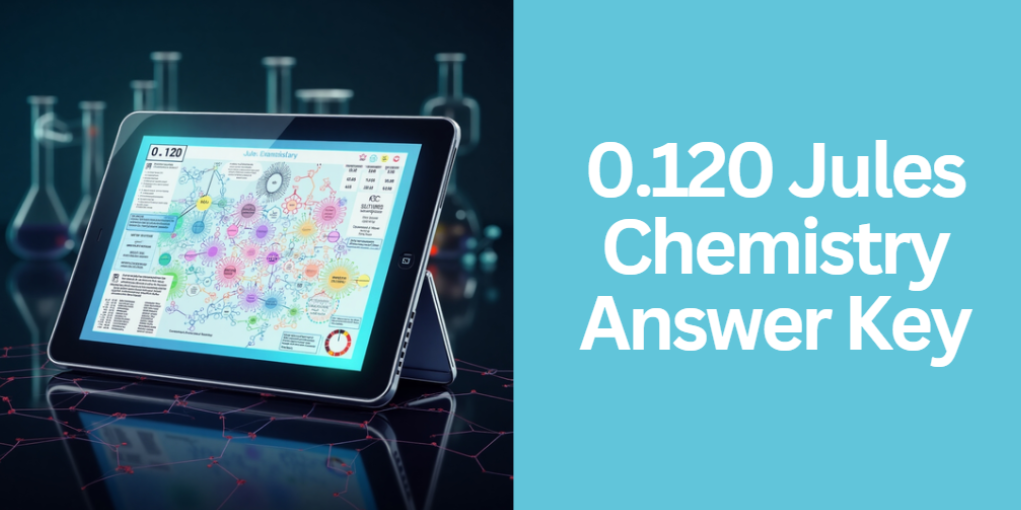Ultimate Guide to the 0.120 Jules Chemistry Answer Key: Everything Students Need to Know
The 0.120 Jules Chemistry Answer Key has become a popular resource among students preparing for advanced chemistry exams. Whether you’re studying for a national-level competition, an academic entrance test, or an institutional assessment, this answer key helps you evaluate your knowledge and identify areas for improvement.
It simplifies the process of self-checking answers while offering a detailed view of question patterns and correct responses.In this guide, we’ll explain what the 0.120 Jules Chemistry Answer Key is, how it works, and most importantly—how you can use it to boost your chemistry performance.
Background and Context
Understanding the purpose and structure of the 0.120 Jules Chemistry Answer Key starts with recognizing the kind of exam it supports. It typically aligns with standardized competitive chemistry tests that include three types of questions:
- MCQs (Multiple Choice Questions) – These require selecting one correct answer from a list of options.
- MSQs (Multiple Select Questions) – These have multiple correct answers, and all must be selected to earn full marks.
- NATs (Numerical Answer Type) – These questions require you to input a precise numerical value, sometimes with a small margin of tolerance.
The answer key is often provisional, meaning it may be subject to revision. It is usually released shortly after the exam to help students gauge their performance before official results are announced.
Detailed Breakdown of the 0.120 Jules Chemistry Answer Key
Multiple Choice Questions (MCQs)
MCQs form the base of most chemistry exams. These questions test your understanding of fundamental concepts and your ability to quickly apply them.
For example:
| Question Number | Correct Answer | Marks |
|---|---|---|
| 1 | A | 1 |
| 2 | C | 1 |
| 5 | B | 2 |
In the 0.120 Jules Chemistry Answer Key, MCQs are clearly labeled with the correct option. By comparing your answers, you can estimate your total score in this section. If you answered Question 1 with option A, you gain 1 mark; if not, you score zero for that question.
Multiple Select Questions (MSQs)
MSQs are more complex and require selecting all the correct options. Selecting only some of them typically results in zero marks, as these questions often do not allow for partial credit.
Here’s a sample breakdown from the answer key:
| Question Number | Correct Options | Marks |
|---|---|---|
| 31 | A, B, C | 2 |
| 32 | B, D | 2 |
You must be cautious while attempting MSQs. If you miss even one correct option or select an incorrect one, the entire answer may be considered invalid. Reviewing the 0.120 Jules Chemistry Answer Key after your exam helps highlight which MSQ concepts you misunderstood, allowing you to focus on improving them.
Numerical Answer Type (NAT)
Numerical questions demand high accuracy. These are usually calculation-based and may involve mole concepts, thermodynamics, equilibrium, or reaction kinetics.
For example:
| Question Number | Accepted Range | Marks |
|---|---|---|
| 41 | 2.00 – 2.00 | 1 |
| 42 | 3.00 – 3.00 | 1 |
In some cases, slight variation is allowed (e.g., ±0.01). The answer key lists either a fixed value or a permissible range, as seen in the 0.120 Jules Chemistry Answer Key. This helps you understand if minor calculation differences will affect your final score.
How to Use the 0.120 Jules Chemistry Answer Key Effectively
The best way to use the answer key is to treat it as a learning tool, not just a scorecard. Here are some strategies for effective use:
Self-Assessment
After completing a mock test or the actual exam, compare each answer with the 0.120 Jules Chemistry Answer Key. Keep a notebook to tally your correct and incorrect answers. This process reveals your score, accuracy rate, and question types where you struggled.
Identify Weak Areas
Group your incorrect answers by topic. For example, if you missed most NAT questions from the thermodynamics section, you know that’s a weak point. The answer key helps you quickly identify these trends.
Update Your Study Plan
Use the insights gained to adjust your study schedule. Spend more time on problem areas and less time reviewing what you already know well. Practice more questions of the type (MCQ, MSQ, or NAT) where you scored the lowest.
Expert Insights and Analysis
Understanding Trends
Experts often analyze answer keys like this one to identify recurring patterns in exam papers. For example, if every year a significant number of NAT questions come from electrochemistry, that’s a clue for next year’s preparation.
Avoiding Common Mistakes
Students often misread MSQs by assuming only one correct answer or make rounding errors in NATs. These are avoidable with practice and better familiarity with the format—something the 0.120 Jules Chemistry Answer Key provides clearly.
Professional Recommendations
Teachers and chemistry mentors suggest using answer keys weekly during the last month of exam prep. Review 2–3 full-length practice papers per week and cross-check with the Jules Chemistry Answer Key to build confidence.
Conclusion
The 0.120 Jules Chemistry Answer Key is much more than a simple list of correct responses—it is a comprehensive review tool that, when used properly, can transform the way you prepare for chemistry exams. By offering clear solutions for MCQs, MSQs, and NATs, it allows students to measure their performance with precision, identify weak areas, and refine their strategy.
Whether you’re aiming for a perfect score or simply trying to pass with confidence, integrating the answer key into your routine is a smart and effective step. Use it not just for checking answers, but as a powerful educational resource on your journey toward chemistry excellence.
Recommended Articles
Growth Ideas from Qyndorath: A Comprehensive Guide to Sustainable Success
Ivanka Hrynda Stamford Address: Inside Her Luxury Home, Community Impact & Legacy
The Truth Behind the Deep Purple Farewell Tour Hoax: A Deep Dive into Rock’s Most Misleading Goodbye





